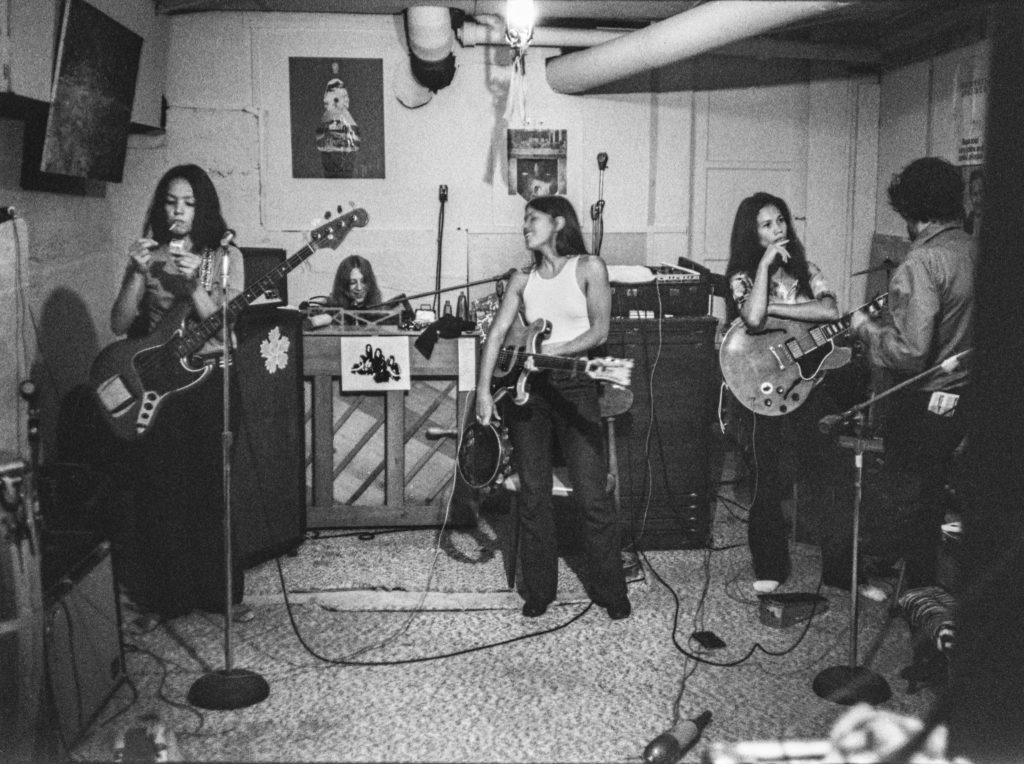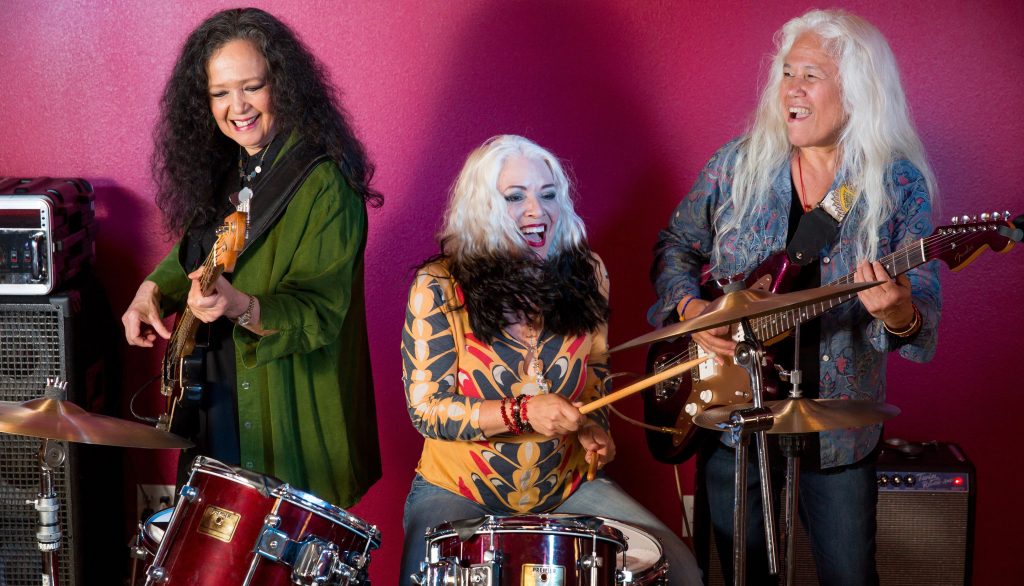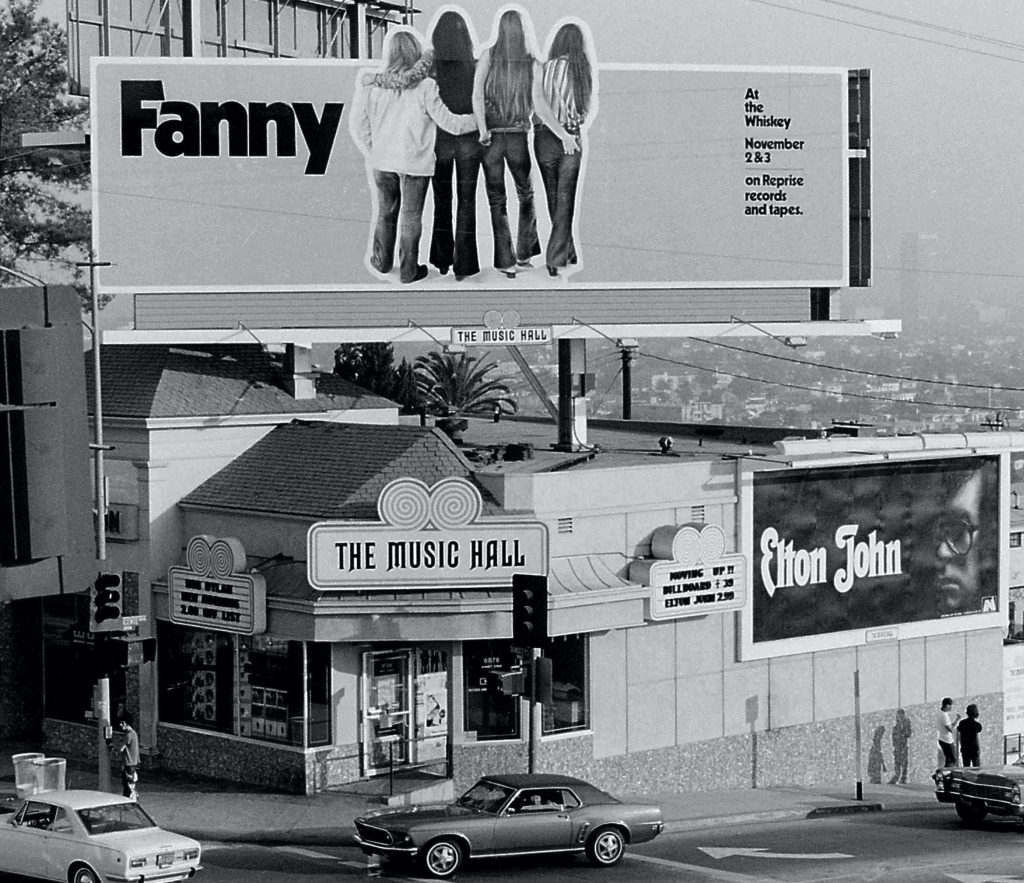By Steph Rodriguez
An all-female rock band almost lost to time is experiencing a warming resurgence through the documentary film “Fanny: The Right to Rock” directed by Bobbi Jo Hart.
The film focuses on the enduring legacy of Fanny’s trailblazing career as they burst onto the Los Angeles music scene emerging from Sacramento with their groundbreaking sound and impeccable musicianship. Their raw talent heard across five critically acclaimed albums led the group to achieve Top 40 success with songs like “Charity Ball” and “Butter Boy” climbing the Billboard Hot 100 chart during the 1970s.
The four-piece band caught the attention and respect of rock legends such as David Bowie and Def Leppard frontman Joe Elliott. Fanny often jammed with Bonnie Raitt and Joe Cocker at their legendary party pad, adoringly known as “Fanny Hill” in West Hollywood. In the film, singer and lead guitarist June Millington described it as a “sorority with electrical guitars.”
They’re a band that’s influenced groups like The Runaways and The Go-Go’s, and toured worldwide with Jethro Tull and Humble Pie. Yet, their story and their music didn’t receive the breakthrough success many, including Bowie, feel Fanny so rightly deserved.
“People are always saying, ‘God, I wish I’d known who you were back then. I’m so pissed off that I didn’t discover you until I was 50 years old,’” said bassist Jean Millington, who is also June’s sister, from her home in Davis. “We get that comment over and over again, people saying they can’t believe they missed us.”
Now, a special screening of “Fanny: The Right to Rock,” co-presented by the Crocker Art Museum and California Humanities, is set for Thursday, Nov. 21, at 6:30 p.m. It’ll be followed by a Q&A with Hart, Jean and drummer Brie Darling.
“Sacramento is a very sacred space,” Hart said. “Jean and June, they went to McClatchy High School, and I really hope the people from the high school find out about this screening and encourage young people or teachers to come and see these two alumni.”
Discovering Fanny

Like many fans who stumbled upon Fanny’s music decades after they disbanded, Hart said she unexpectedly found the rock band while scrolling through the Taylor Guitars website searching for a new instrument for her daughter. When she clicked on a tab that revealed a collection of stories about musicians who proudly play Taylor guitars, Hart was taken by what she saw.
“As I was scrolling down, this photo scrolls up and it’s this woman wielding this electric guitar with this rock look on her face,” Hart said. “She’s rocking out and she has this flaming gray hair. It turns out, it was June Millington, the lead guitarist of Fanny.”
Hart abandoned looking for guitars at that point. Inspired by June Millington’s story, she began researching as much as she could about Fanny. But, to her disappointment, she couldn’t find much.
“I serendipitously discovered them. I was equally excited and equally pissed off when I discovered the band. I was excited to discover this band I’d never heard of and it was groundbreaking,” Hart said. “These women, who are self-taught musicians, writing their own songs, playing their own instruments, starting a band — the first all-woman rock band to get signed by a major label. But I was pissed off, because, how did I miss them? How did I not know about them? How does everyone not know about this band?”
“Equally pissed off” and “excited” are two ingredients Hart says are crucial for her to get fired up about making a new film. Fanny ignited that flame.
‘Music is our ticket to the world’

June and Jean Millington’s Sacramento roots run deep.
In 1961, they immigrated from the Philippines with their parents during their seventh- and eighth-grade years. June described feeling culturally behind, like a “fish out of water,” so the sisters turned to ukuleles and guitars, two instruments that grounded them in their new surroundings.
“We learned songs on the radio, and then, eventually, we teamed up with two other girls. We were called Four Jays, all our names began with J,” Jean Millington said. “When I was in eighth grade and June was in ninth grade, we performed for a varsity show at the junior high, and for the first time, people stopped to talk to us. They knew who we were. They wanted to get to know us. So we thought, ‘My God, music is our ticket to the world.’”
Once the sisters entered McClatchy High School, they formed a new band called the Svelts and their father even refurbished an old bus to help the girls tour comfortably. In the late-’60s, the musicians moved to L.A., gigging hard at various clubs and hitting open-mic nights at the Troubador under the name Wild Honey when they caught the interest of music producer Richard Perry. The driven group, known for playing Motown covers and letting their sheer musicianship dispel doubt about their ability to succeed in a male-dominated industry, signed to Reprise Records in 1969 as Fanny.
“We were so tight. You knew what the other person was doing, you didn’t have to think about it. You could count on the other person to come up with what we needed to make the music work,” Jean Millington said. “We were like a big ship where everyone was on the same course. That’s a wonderful thing. I want people to know just how excellent we were as a band. You have to really be a musician to play like we played — there’s no getting around that. We were excellent musicians.”

Fanny disbanded after their fifth album, “Rock and Roll Survivors,” released in 1974, but the musicians would reunite once again decades later. In 2016, original drummer Brie Darling joined the Millington sisters for a live performance, which reignited their bond and inspired the group to form a new band, Fanny Walked the Earth, which released a self-titled album in 2018.
Hart’s film captures these tender moments between the women rehearsing as Fanny Walked the Earth, contextualized with interviews from everyone from Cherie Currie of The Runaways, to Gail Ann Dorsey — who played bass for Bowie and countless others — to Kate Pierson of the B-52’s and many more rock legends sharing their stories of how they discovered Fanny.
“When Fanny got the new rock record deal, I felt like that was the perfect moment to follow the band. Follow them getting back together, making this new rock album, all of them being in their late 60s,” Hart said. “They deserve to be recognized now, including being in the Rock & Roll Hall of Fame.”
“Fanny: The Right to Rock” premiered in Canada in 2021. Two years later, Fanny performed live together at Yerba Buena Gardens in San Francisco during CAAMFest, the world’s largest film festival that highlights Asian American and Asian film, food and music.
With the film’s upcoming screening at the Crocker, Jean Millington says she hopes it inspires new generations to follow their dreams, challenge the current norm and write their own story.
“Discover the music. That’s what I would say. We were really a band. It was the four of us together. It was not made up, it was not put together by anybody. It was real organic,” Jean Millington said. “What we did and what came out was really quite phenomenal. Not that many bands can say the same thing, even back then, there were a lot of really great bands, but I think we were really unique.”
See “Fanny: The Right to Rock” at the Crocker Art Museum, 216 O St., on Thursday, Nov. 21 at 6:30 p.m.; $8-$16. For tickets, visit crockerart.org.
This story was funded by the City of Sacramento’s Arts and Creative Economy Journalism Grant to Solving Sacramento. Following our journalism code of ethics and protocols, the city had no editorial influence over this story and no city official reviewed this story before it was published. Our partners include California Groundbreakers, Capital Public Radio, Outword, Russian America Media, Sacramento Business Journal, Sacramento News & Review, Sacramento Observer and Univision 19. Sign up for our “Sac Art Pulse” newsletter here.


When I lived in LA, I heard of the band through their label, which put them om its promotional label compilations. I was on the label’s address list so I always knew when a new one was out.
When I lived in Sacramento, I was here for twenty years before ANYbody mentioned that they were a local band.
Maybe there’s a spare tune waiting for a home. I make local compilation CDs, and since they qualify as local, I’d invite them to see my web page to consider and contribute a tune.